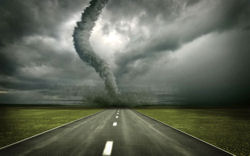 E - The Environmental Magazine
E - The Environmental Magazine
Written and edited by Roddy Scheer and Doug Moss
September 24, 2012 -- Dear EarthTalk: What is the scientific consensus on all the extreme weather we’ve been having—from monster tornadoes to massive floods and wildfires? Is there a clear connection to climate change? And if so what are we doing to be prepared? -- Jason Devine, Summit, PA
Extreme weather does not prove the existence of global warming, but climate change is likely to exaggerate it—by messing with ocean currents, providing extra heat to forming tornadoes, bolstering heat waves, lengthening droughts and causing more precipitation and flooding.
“A changing climate leads to changes in the frequency, intensity, spatial extent, duration and timing of extreme weather and climate events, and can result in unprecedented extreme weather and climate events,” reports the Intergovernmental Panel on Climate Change (IPCC), an independent group of leading climate scientists convened by the United Nations to provide the world with a clear scientific view on the current state of knowledge in climate change and its potential environmental and socio-economic impacts.
While most scientists don’t dispute the link between global warming and extreme weather, the once skeptical public is now starting to come around—especially following 2011, when floods, droughts, heat waves and tornadoes took a heavy toll on the U.S. According to a poll conducted by researchers at Yale University’s Project on Climate Change Communication, four out of five Americans reported personally experiencing one or more types of extreme weather or a natural disaster in 2011, while more than a third were personally harmed either a great deal or a moderate amount by one or more of these events. And a large majority of Americans believe that global warming made several high profile extreme weather events worse, including record high summer temperatures nationwide, droughts in Texas and Oklahoma, catastrophic Mississippi River flooding, Hurricane Irene and an unusually warm winter.
The IPCC wants world leaders to err on the side of caution in preparing their citizens for extreme weather events that will likely become more frequent; earlier this year they released a report entitled “Managing the Risks of Extreme Events and Disasters to Advance Climate Change Adaptation” to help policymakers do just that. The report is considered a must read in coastal, arid and other especially vulnerable areas.
As for the U.S. government, the National Oceanic and Atmospheric Administration (NOAA) tracks weather and storms, while the Federal Emergency Management Agency (FEMA) deals with the impacts of extreme weather and other disasters. But critics would like to see Congress and the White House do more to increase Americans’ preparedness. “The U.S. [in 2011] experienced a record fourteen weather-related disasters each in excess of a billion dollars—and many more disasters of lesser magnitudes,” reports the non-profit Climate Science Watch (CSW). “Yet the U.S. has no national climate change preparedness strategy; and Federal efforts to address the rising risks have been undermined through budget cuts and other means.” CSW and others are calling for the creation of a new cabinet-level agency called the National Climate Service to oversee both climate change mitigation as well as preparedness for increasingly extreme weather events.
CONTACTS: IPCC report, www.ipcc-wg2.gov/SREX/images/uploads/SREX-SPMbrochure_FINAL.pdf; Yale Project, http://environment.yale.edu/climate/files/Extreme-Weather-Climate-Prepar... FEMA, www.fema.gov; NOAA, www.noaa.gov; Climate Science Watch, www.climatesciencewatch.org.
EarthTalk® is written and edited by Roddy Scheer and Doug Moss and is a registered trademark of E - The Environmental Magazine (www.emagazine.com). Send questions to: earthtalk@emagazine.com. Subscribe: www.emagazine.com/subscribe. Free Trial Issue: www.emagazine.com/trial.








Recent comments